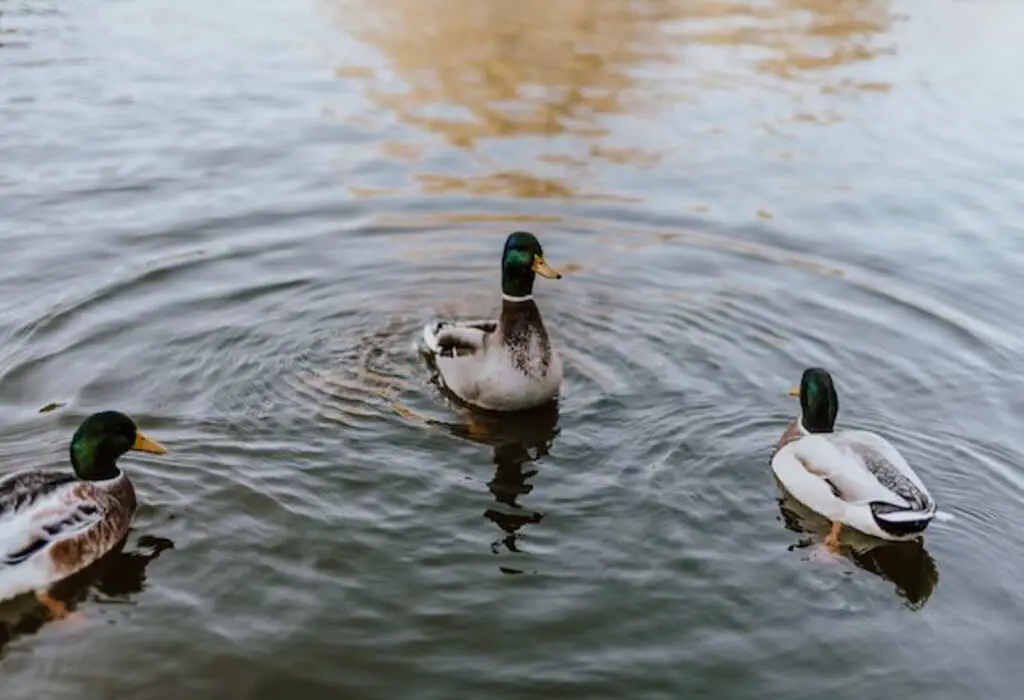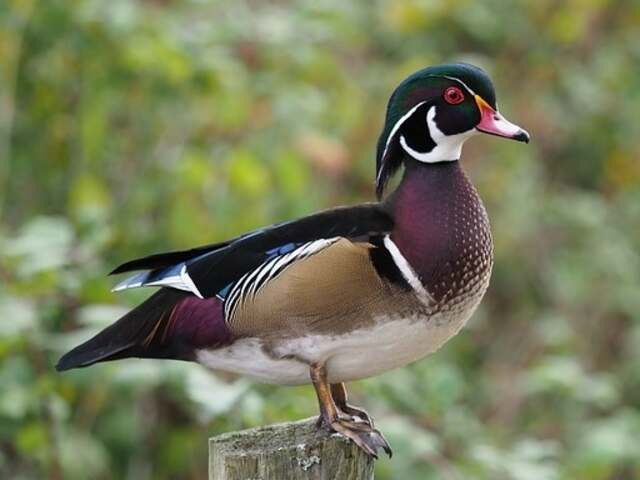Welcome to the fascinating world where ducks and ponds intersect! Join us as we explore the essential relationship between ducks and their watery habitats. In this exploration, centered around the question ‘Do Ducks Need a Pond?’, we’ll uncover the vital role ponds play in the lives of these beloved waterfowl, shedding light on the importance of these aquatic ecosystems for duck survival and thriving ecology.”
Table of Contents
- 1 The Importance of Ducks and Their Habitat
- 2 Do Ducks Need a Pond?
- 3 Yes, Ducks Need a Pond
- 4 Types of Ponds for Ducks:
- 5 Building a Pond for Ducks
- 6 Alternatives to Ponds
- 7 The Importance of Providing Water Sources for Ducks
- 8 Ponds are Ideal Habitats for Ducks
- 9 Alternatives Available if Necessary
- 10 Author
The Importance of Ducks and Their Habitat
Ducks are fascinating creatures that play an essential role in the ecosystem. They provide food for predators, aid in pest control, and can help disperse plant seeds. Additionally, they’re a joy to watch and can add to the beauty of nature.
However, like all living beings, ducks need a suitable habitat to thrive. Their natural habitats are wetlands such as freshwater marshes, swamps, ponds, lakes and rivers.
These habitats provide not only food but also shelter and nesting sites for ducks.
Because of their unique biological adaptations to waterfowl life, such as webbed feet to paddle through water with ease or waterproof feathers for keeping them dry while swimming – it’s important that they have access to natural sources of water.
Do Ducks Need a Pond?
Ponds are synonymous with ducks – it’s almost impossible not to imagine a pond when you think about ducks. But do they really need one? The short answer is yes!
Providing them with a pond will give them an excellent habitat that meets their needs. Ducks require water for several reasons; first off they need it for hydration just like humans do!
Secondly, they use the water source as a place to clean themselves by preening their feathers, which helps keep them fluffy and better insulates against the cold weather.
But beyond basic needs-Natural wet environments provide crucial areas where ducks can feed on aquatic vegetation found around or below the surface of ponds and allow them to socialize amongst others of their own kind-this sense of community is important for ducklings who learn vital social skills from parents or other nearby adult ducks.
– Providing your pet ducks with access to fresh, clean water is not only necessary but also contributes greatly towards creating an ideal environment for them.
In the next sections we’ll explore more about the benefits of ponds for ducks, the different types of ponds that are suitable for them, how to build one and alternatives if building a pond isn’t an option.
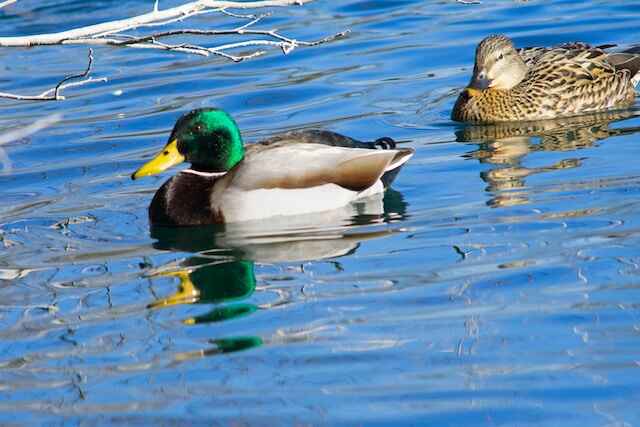
Yes, Ducks Need a Pond
Ducks are waterfowl and are naturally at home in water. Water is not only essential to their life, but it’s also a vital component of their well-being.
A pond provides an ideal habitat for ducks to thrive and lead a healthy life. The natural environment of ponds offers numerous benefits that meet the needs of ducks.
Water is Essential for Ducks’ Survival
Ducks need water for several reasons. First and foremost, they use it to stay hydrated. Water helps them regulate their body temperature by dissipating heat during hot weather and keeping them warm when temperatures drop.
Without water, ducks can suffer from dehydration, which can lead to severe health problems. In addition to hydration, ducks need water for digestion purposes as well.
They use it to moisten food before swallowing it whole, making it easier for them to digest. Without access to sufficient water sources, ducks can suffer from digestive issues like impacted crops or malnutrition.
Ponds Provide a Natural Habitat for Ducks
Ponds serve as perfect habitats for ducks because they provide everything they need in one place – food, shelter and nesting sites – while also offering ample opportunities for swimming and socialization with other ducks.
The shallow edges of ponds are where aquatic plants like duckweed grow that provide a valuable food source that many species of duck prefer while floating on the surface of the pond using their beaks as strainers catching insects underneath too small to see with human eyesight.
Additionally, insects living in the pond also become food sources when they emerge as adults or larvae. Another benefit of ponds is the opportunities they offer for socializing with other birds.
Ponds are places where multiple bird species coexist together harmoniously; this allows young birds the opportunity to learn critical communication skills from more experienced adults about how best navigate through their world and avoid predators.
Ponds are essential habitats for ducks, as they provide everything a duck needs in one place. Water is important for their survival and well-being, so providing them with a pond is crucial if you want them to thrive.
Ponds offer natural habitats where ducks can swim, feed and socialize with other birds.
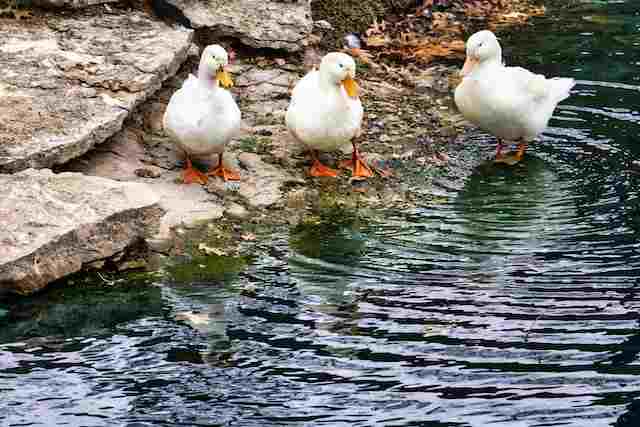
Types of Ponds for Ducks:
The Natural Pond
A natural pond is often the ideal habitat for ducks, as it offers them a self-sufficient ecosystem that mimics their natural habitat.
It provides ample food sources like aquatic plants, insects, and small animals. The pond also offers opportunities for socialization with other ducks.
Additionally, natural ponds provide for nesting sites and breeding grounds. However, there are some drawbacks to a natural pond.
Firstly, predators like raccoons and foxes may be present in the area and can harm the ducks or their eggs. Additionally, water quality can deteriorate over time due to algae growth or pollution.
The Man-made Pond
Man-made ponds are often created specifically for ducks in an effort to provide them with an ideal habitat while controlling some of the drawbacks associated with a natural pond.
The ponds can be made from concrete or lined with a synthetic liner that prevents water leakage into the surrounding soil.
The benefits of man-made ponds include that they allow better control of water quality, provide safety from predators, and offer more flexibility in terms of design (e.g., deeper areas, shallower areas).
Moreover, man-made ponds can be designed to include features like fountains or aerators to keep the water fresh.
However, man-made ponds require regular maintenance; if not maintained properly, they can become stagnant and negatively affect the duck’s health.
The Combination Pond
A combination pond includes both natural elements (such as plants) and man-made elements (such as aerators) in one ecosystem.
These hybrid designs aim at providing benefits of both types of habitats while minimizing their drawbacks.
Combination ponds are beneficial because they offer a variety of food sources along with an aesthetically pleasing environment which mimics both urban and rural environments where ducks thrive.
The Garden Pond
A garden pond is another type of pond suitable for ducks. These ponds are often designed as an aesthetically pleasing water feature in a private garden setting.
Garden ponds offer a safe and controlled environment for ducks to swim and socialize while the owner enjoys the views from their home or patio.
However, garden ponds may not be entirely suitable for ducks, as they are often smaller than natural or man-made ponds.
Consequently, they may not provide ample food sources or exercise opportunities, especially if the number of ducks is more than what the pond can accommodate.
There are several types of ponds suitable for ducks, each with its pros and cons.
Natural ponds provide an ideal habitat but require maintenance to keep water quality stable, while man-made ponds allow better control but require regular maintenance.
Combination ponds offer benefits of both types of habitats while minimizing their drawbacks.
Garden ponds offer an aesthetically pleasing environment, but may not provide ample food sources or exercise opportunities required by ducks living in larger groups.
Building a Pond for Ducks
Tips on Building a Pond Suitable for Ducks
Building a pond that is suitable for ducks can be an exciting and rewarding project. However, there are some essential tips to keep in mind when embarking on this adventure.
First, ensure that the pond is at least 10 feet by 15 feet in size. This size will provide ample space for ducks to swim and socialize without overcrowding the area.
Additionally, it is crucial to have an adequate depth of about 2-4 feet in the deepest area of the pond. One of the most important considerations when building a pond for ducks is vegetation.
Ducks require aquatic vegetation such as duckweed, cattails, and water lilies to feed on and hide from predators. So it’s best to include these plants in your pond’s design.
Another thing to consider when creating your duck pond is the location. It should be placed in an open space with some trees or bushes nearby so that they can find cover during scorching weather conditions or predators’ attacks.
Safety Considerations
Ensuring safety considerations are vital when building a duck pond. Firstly, it is essential not to use any chemicals such as pesticides or fertilizers around the pond area as these could contaminate their water source and cause disease or death among ducks.
Predators like raccoons, foxes, cats can also pose significant threats to ducks living near ponds; therefore, it’s crucial to build protective barriers around your duck’s habitat.
Another safety consideration worth mentioning relates to water quality; ensure that your duck’s habitat filters any waste out with enough oxygenation levels through natural means like waterfalls and fountains or artificial filtration systems like pumps and filters.
Always consider other domestic animals living within your compound that could pose harm during interaction with ducks living near ponds; supervise their activities closely and, if possible, keep them in separate enclosures.
Conclusion
Building a suitable habitat for ducks that includes a pond is an excellent idea for providing them with an environment they can thrive in.
Ensure to include enough vegetation, filter wastes naturally or artificially, have appropriate dimensions, and protect it from predators, and you’ll have happy ducks.
Ducks are remarkable creatures that will provide entertainment and a sense of calmness to your space.
Building a duck pond is the right choice to make when seeking ways to create harmony within an ecosystem while simultaneously experiencing the beauty of nature without leaving home.
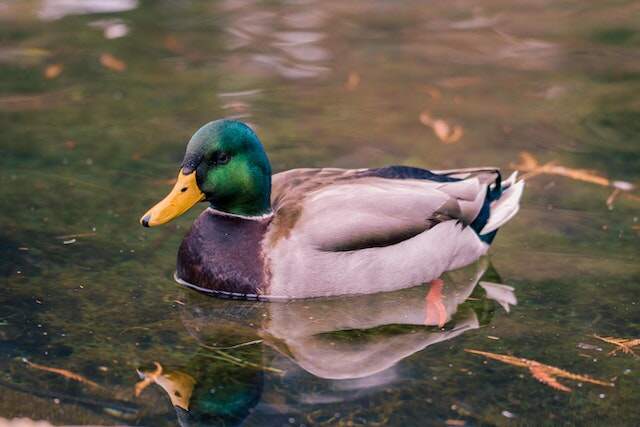
Alternatives to Ponds
Ducks are aquatic birds that need water to survive. However, not everyone has the space or resources to build a pond for their feathered friends.
If this is your situation, there are still several alternatives available that can provide ducks with the water they need. Here are some options you may consider:
Kiddie pool
A kiddie pool is a quick and easy option for those who cannot build a pond but want to give their ducks access to water.
These pools are inexpensive and can hold enough water for ducks to swim, dunk their heads, and drink from.
However, the size of the pool may be an issue if you have more than a few ducks, as they tend to splash around and create waves that can spill over.
Bird bath
A bird bath is another alternative that can work for ducks, especially if you have only one or two of them. A bird bath is shallower than a kiddie pool, but still provides enough water for ducks to play in and drink from.
Bird baths come in different sizes and materials, so it’s important to choose one that matches your needs and budget.
Plastic tub
If neither kiddie pools nor bird baths suit your needs, plastic tubs can be an inexpensive alternative worth considering. These containers can hold enough water for several ducks depending on the size of the tub used.
The Pros And Cons Of Alternatives To Ponds For Ducks
While these alternatives are great options when building a pond isn’t feasible or practical in your current situation, they do come with both pros and cons.
On one hand, alternatives such as kiddie pools or plastic tubs are more affordable than building a duck pond and require less space. Additionally, these options may be easier to clean compared to maintaining a large pond.
On the other hand, alternatives may not provide enough space for ducks to swim around and socialize, which can be detrimental to their physical and mental health.
Similarly, if you’re considering the bird bath option, it’s essential to clean it regularly as stagnant water can easily become a breeding ground for harmful bacteria.
Ultimately, while alternatives serve as excellent temporary solutions for providing water sources for ducks, they are not a substitute for a pond.
If you plan on keeping ducks long-term or want them to have access to the best possible living conditions, building or investing in a duck pond is the ideal choice.
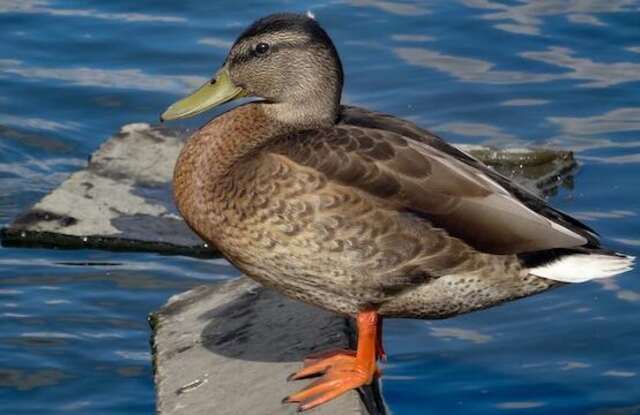
The Importance of Providing Water Sources for Ducks
Water is essential for ducks’ survival, and it’s crucial to provide them with an adequate water source. Ducks use water for many activities, including swimming, preening, and socializing.
Without access to water, ducks can become stressed and suffer from health problems. Providing a water source also attracts ducks and other wildlife to your property, adding beauty and biodiversity to the environment.
It’s essential to ensure that the water source is clean and safe for ducks to use. If you have a pond or any other permanent water feature on your property, it’s important to maintain it properly.
Ponds are Ideal Habitats for Ducks
Ponds provide an ideal habitat for ducks by providing them with a natural environment where they can swim, feed on aquatic plants and insects, and build their nests. The availability of fresh water also helps regulate their body temperature.
A well-designed pond can be aesthetically pleasing while providing the necessary habitat requirements for the ducks.
A variety of plant species should be grown around the pond since these plants serve as a food source for insects that are consumed by the ducks.
Alternatives Available if Necessary
While ponds are ideal habitats for ducks, there are alternatives available if building a pond is not feasible. One alternative option is using kiddie pools or bird baths as temporary sources of freshwater.
These options are more suitable in areas where space or budget limitations make building a permanent pond challenging.
However, you should keep in mind that these alternatives may not provide enough space or depth needed by some duck species like diving ducks.
Also, even though bird baths might provide enough drinking water for small groups of birds at once in most cases; they do not offer enough room or clean swimming space needed by larger flocks.
: Providing access to fresh water sources is vital for maintaining healthy duck populations. Ponds are an ideal habitat, but there are alternatives available if building a pond is not possible.
Remember that if you choose to provide water for ducks using kiddie pools or bird baths, ensure that the water source is clean and changed regularly.
Creating a healthy and safe environment for ducks to live in can be both satisfying and rewarding.

